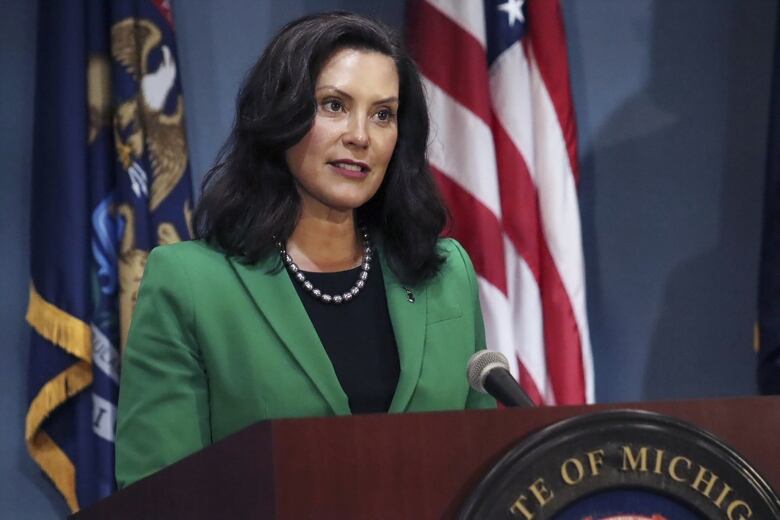Canada invokes decades-old treaty with US requests talks on fate of Line 5 pipeline
The federal government has invoked a dispute resolution process in a 1977 pipeline treaty with the United States in an effort to keep the economically vital Line 5 pipeline in operation.
The Enbridge Inc. pipeline, which runs through Michigan from the Wisconsin city of Superior to Sarnia, Ont., crosses the Great Lakes beneath the environmentally sensitive Straits of Mackinac, which links Lake Michigan to Lake Huron.
The pipeline provides nearly half of the fuel supply in Canada's two largest provinces, Ontario and Quebec. It carries up to 540,000 barrels of Canadian crude oil and other petroleum products per day â€" providing everything from jet fuel for Toronto Pearson Airport to gas for home heating.
 The Line 5 pipeline carries Canadian petroleum from Western Canada and Wisconsin, though Michigan to Sarnia, Ont. (CBC)
The Line 5 pipeline carries Canadian petroleum from Western Canada and Wisconsin, though Michigan to Sarnia, Ont. (CBC) The dispute erupted last year when Michigan Gov. Gretchen Whitmer â€" citing the risk of a catastrophe in the Straits of Mackinac â€" abruptly revoked the easement that had allowed the line to operate since 1953. Enbridge and the government of Michigan had been engaged in court-ordered mediation to resolve the dispute.
Gordon Giffin, a former U.S. ambassador to Canada currently acting as legal counsel to the Canadian government, recently informed the U.S. court that Canada had formally requested negotiations with Washington under the 1977 Canada-U.S. treaty on pipelines.
Foreign Affairs Minister Marc Garneau said the government made the move to ensure Line 5 remains in operation.
"In response to Michigan's efforts to shut down Line 5, Canada has raised its significance for Canadian economic and energy security at the highest levels of the U.S. federal government," he said in a media statement.
 Michigan Gov. Gretchen Whitmer says she wants to shut down the Line 5 pipeline to prevent a 'catastrophic oil spill' in the Great Lakes. (Michigan Office of the Governor/The Associated Press)
Michigan Gov. Gretchen Whitmer says she wants to shut down the Line 5 pipeline to prevent a 'catastrophic oil spill' in the Great Lakes. (Michigan Office of the Governor/The Associated Press) Giffin's letter asks the court to delay any decisions on the pipeline to give the two countries room to negotiate.
Michigan Attorney General Dana Nessel said "the letter filed by Canada today provides no legal basis for delaying consideration of our case."
"I am disappointed that the Government of Canada continues to align itself with Enbridge's desire to keep using State-owned lands to pump oil through the heart of the Great Lakes," she said in an emailed statement.
Michigan has maintained that the U.S. federal court does not have jurisdiction over the matter and says the case should be referred to a state court.
The Canadian government filed an amicus brief with the U.S. court in May siding with Calgary-based Enbridge and citing the treaty, stating that it guarantees the uninterrupted flow of oil and gas across the border.
At the time, Prime Minister Justin Trudeau said the government wanted to see the mediation process between Michigan and Enbridge continue. Michigan withdrew from mediation with Enbridge in September.
The treaty states that any dispute between the two countries can be settled with bilateral negotiations but can be elevated to arbitration should those negotiations fail.
Enbridge said it's grateful for the support from the Canadian government and is hoping for a resolution, through diplomatic relations or through continued mediation with the state.
"Our goal from the beginning has been to work cooperatively to reconcile interests, resolve disputes and move forward in the best interest of people throughout the region," Enbridge communications adviser Tracy Larsson said in an emailed statement.
0 Response to "Canada invokes decades-old treaty with US requests talks on fate of Line 5 pipeline"
Post a Comment